ACX702: Applied Research Methods Portfolio and Reflection
VerifiedAdded on 2022/10/19
|22
|5715
|2
Project
AI Summary
This research methods portfolio, submitted by a student, presents three practical tasks, a reflexive report, and demonstrates the application of research methodologies. The first section analyzes ethical considerations in data collection from social media, focusing on Facebook features, and includes a survey assessing community awareness of a local charity shop. The second part incorporates a case study examining the complexities of filming a Hollywood drama television show, 'Billions', through interviews and archival material. The reflexive report reflects on the learning experience, highlighting the importance of reflexive skills, content analysis, and the impact of social media. The document also covers ethical evaluations, and the practical application of research methods to future professional directions. The student critically evaluates the methods used and acknowledges limitations, aiming to enhance future research endeavors.
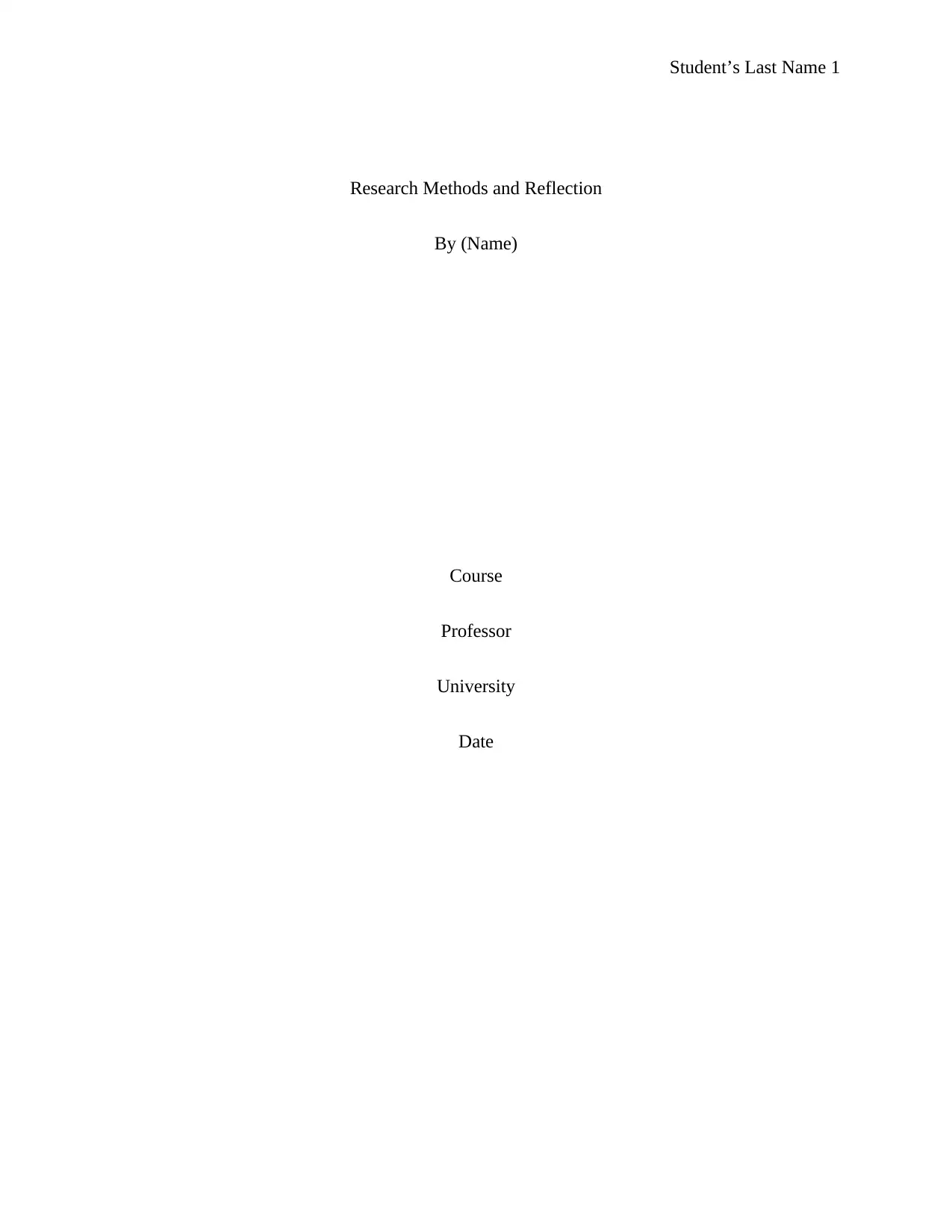
Student’s Last Name 1
Research Methods and Reflection
By (Name)
Course
Professor
University
Date
Research Methods and Reflection
By (Name)
Course
Professor
University
Date
Paraphrase This Document
Need a fresh take? Get an instant paraphrase of this document with our AI Paraphraser
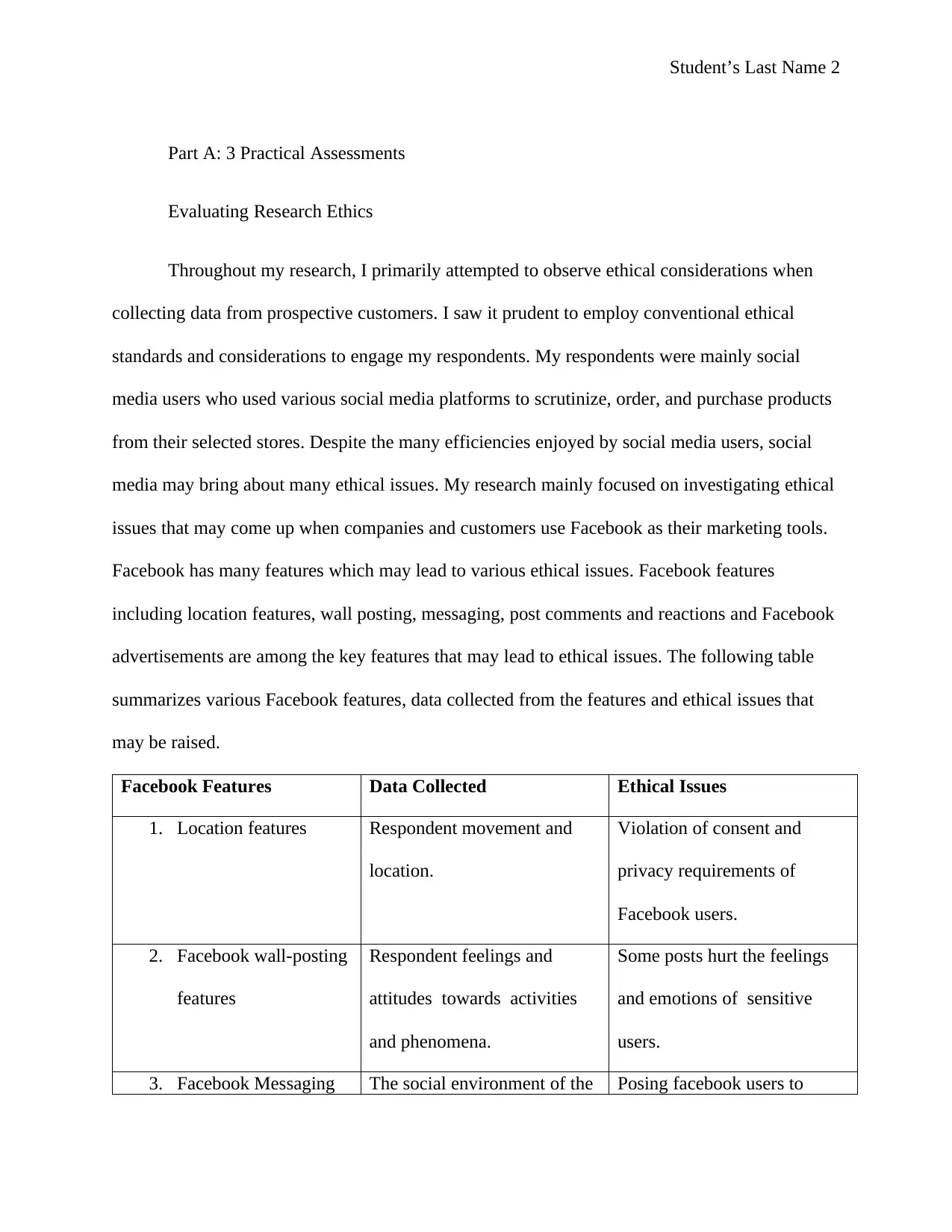
Student’s Last Name 2
Part A: 3 Practical Assessments
Evaluating Research Ethics
Throughout my research, I primarily attempted to observe ethical considerations when
collecting data from prospective customers. I saw it prudent to employ conventional ethical
standards and considerations to engage my respondents. My respondents were mainly social
media users who used various social media platforms to scrutinize, order, and purchase products
from their selected stores. Despite the many efficiencies enjoyed by social media users, social
media may bring about many ethical issues. My research mainly focused on investigating ethical
issues that may come up when companies and customers use Facebook as their marketing tools.
Facebook has many features which may lead to various ethical issues. Facebook features
including location features, wall posting, messaging, post comments and reactions and Facebook
advertisements are among the key features that may lead to ethical issues. The following table
summarizes various Facebook features, data collected from the features and ethical issues that
may be raised.
Facebook Features Data Collected Ethical Issues
1. Location features Respondent movement and
location.
Violation of consent and
privacy requirements of
Facebook users.
2. Facebook wall-posting
features
Respondent feelings and
attitudes towards activities
and phenomena.
Some posts hurt the feelings
and emotions of sensitive
users.
3. Facebook Messaging The social environment of the Posing facebook users to
Part A: 3 Practical Assessments
Evaluating Research Ethics
Throughout my research, I primarily attempted to observe ethical considerations when
collecting data from prospective customers. I saw it prudent to employ conventional ethical
standards and considerations to engage my respondents. My respondents were mainly social
media users who used various social media platforms to scrutinize, order, and purchase products
from their selected stores. Despite the many efficiencies enjoyed by social media users, social
media may bring about many ethical issues. My research mainly focused on investigating ethical
issues that may come up when companies and customers use Facebook as their marketing tools.
Facebook has many features which may lead to various ethical issues. Facebook features
including location features, wall posting, messaging, post comments and reactions and Facebook
advertisements are among the key features that may lead to ethical issues. The following table
summarizes various Facebook features, data collected from the features and ethical issues that
may be raised.
Facebook Features Data Collected Ethical Issues
1. Location features Respondent movement and
location.
Violation of consent and
privacy requirements of
Facebook users.
2. Facebook wall-posting
features
Respondent feelings and
attitudes towards activities
and phenomena.
Some posts hurt the feelings
and emotions of sensitive
users.
3. Facebook Messaging The social environment of the Posing facebook users to
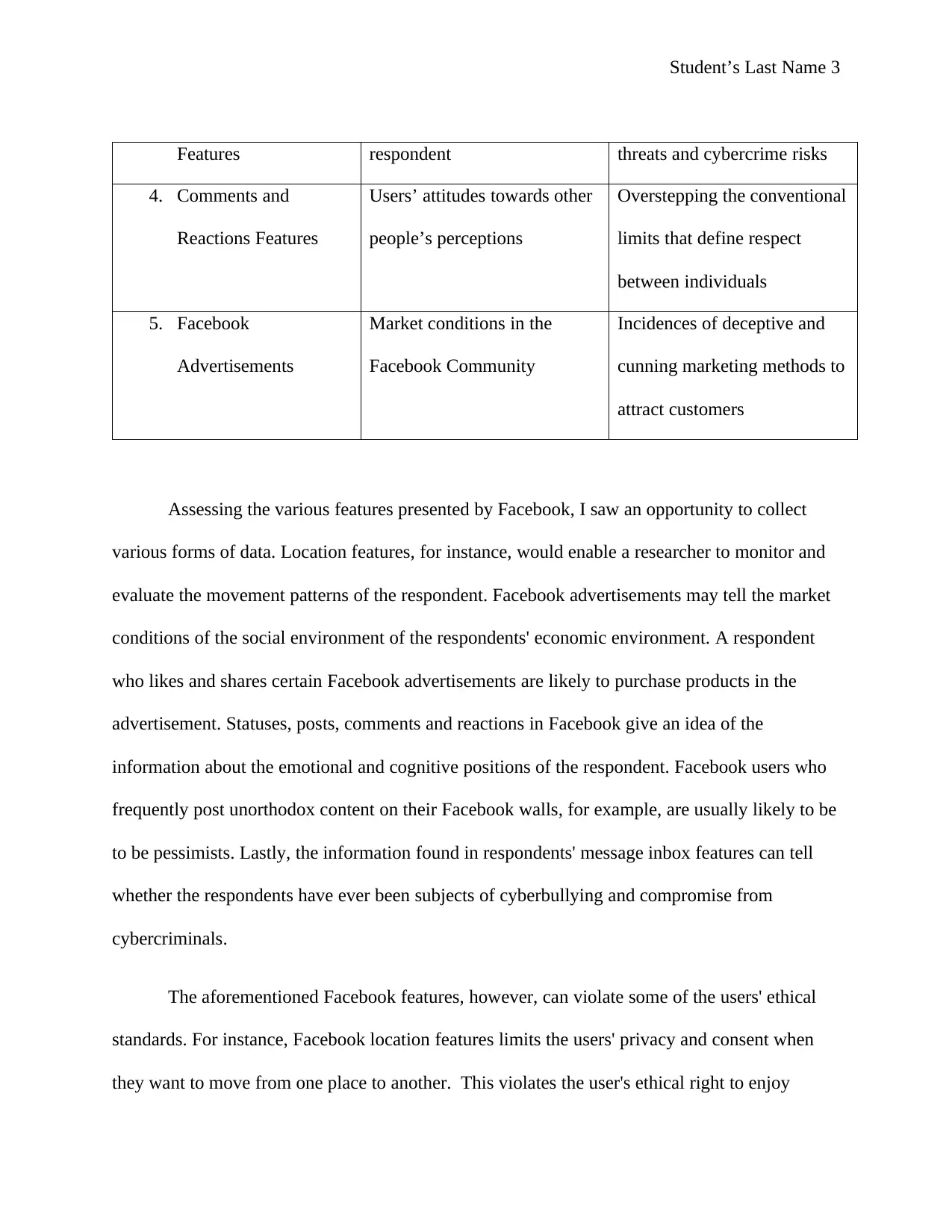
Student’s Last Name 3
Features respondent threats and cybercrime risks
4. Comments and
Reactions Features
Users’ attitudes towards other
people’s perceptions
Overstepping the conventional
limits that define respect
between individuals
5. Facebook
Advertisements
Market conditions in the
Facebook Community
Incidences of deceptive and
cunning marketing methods to
attract customers
Assessing the various features presented by Facebook, I saw an opportunity to collect
various forms of data. Location features, for instance, would enable a researcher to monitor and
evaluate the movement patterns of the respondent. Facebook advertisements may tell the market
conditions of the social environment of the respondents' economic environment. A respondent
who likes and shares certain Facebook advertisements are likely to purchase products in the
advertisement. Statuses, posts, comments and reactions in Facebook give an idea of the
information about the emotional and cognitive positions of the respondent. Facebook users who
frequently post unorthodox content on their Facebook walls, for example, are usually likely to be
to be pessimists. Lastly, the information found in respondents' message inbox features can tell
whether the respondents have ever been subjects of cyberbullying and compromise from
cybercriminals.
The aforementioned Facebook features, however, can violate some of the users' ethical
standards. For instance, Facebook location features limits the users' privacy and consent when
they want to move from one place to another. This violates the user's ethical right to enjoy
Features respondent threats and cybercrime risks
4. Comments and
Reactions Features
Users’ attitudes towards other
people’s perceptions
Overstepping the conventional
limits that define respect
between individuals
5. Facebook
Advertisements
Market conditions in the
Facebook Community
Incidences of deceptive and
cunning marketing methods to
attract customers
Assessing the various features presented by Facebook, I saw an opportunity to collect
various forms of data. Location features, for instance, would enable a researcher to monitor and
evaluate the movement patterns of the respondent. Facebook advertisements may tell the market
conditions of the social environment of the respondents' economic environment. A respondent
who likes and shares certain Facebook advertisements are likely to purchase products in the
advertisement. Statuses, posts, comments and reactions in Facebook give an idea of the
information about the emotional and cognitive positions of the respondent. Facebook users who
frequently post unorthodox content on their Facebook walls, for example, are usually likely to be
to be pessimists. Lastly, the information found in respondents' message inbox features can tell
whether the respondents have ever been subjects of cyberbullying and compromise from
cybercriminals.
The aforementioned Facebook features, however, can violate some of the users' ethical
standards. For instance, Facebook location features limits the users' privacy and consent when
they want to move from one place to another. This violates the user's ethical right to enjoy
⊘ This is a preview!⊘
Do you want full access?
Subscribe today to unlock all pages.

Trusted by 1+ million students worldwide
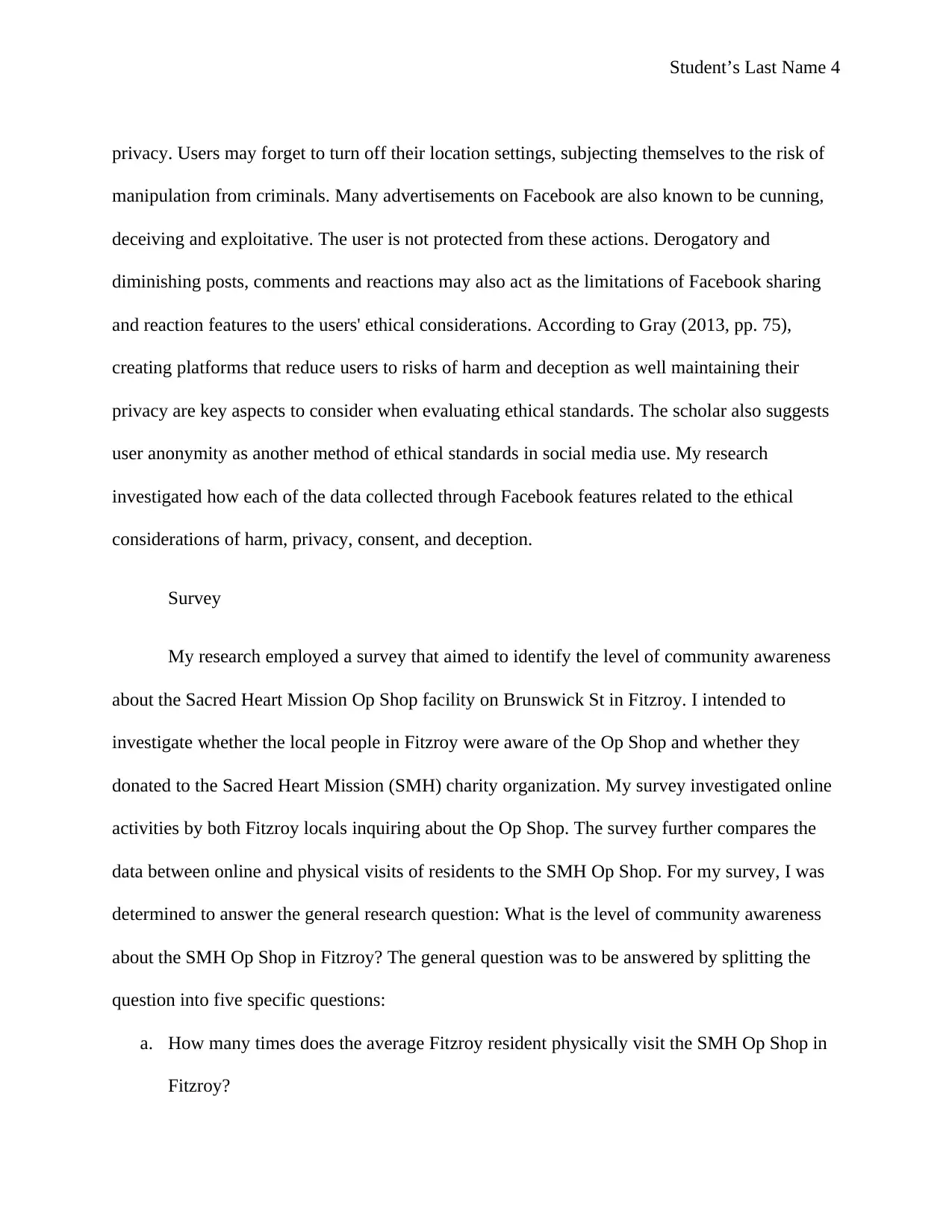
Student’s Last Name 4
privacy. Users may forget to turn off their location settings, subjecting themselves to the risk of
manipulation from criminals. Many advertisements on Facebook are also known to be cunning,
deceiving and exploitative. The user is not protected from these actions. Derogatory and
diminishing posts, comments and reactions may also act as the limitations of Facebook sharing
and reaction features to the users' ethical considerations. According to Gray (2013, pp. 75),
creating platforms that reduce users to risks of harm and deception as well maintaining their
privacy are key aspects to consider when evaluating ethical standards. The scholar also suggests
user anonymity as another method of ethical standards in social media use. My research
investigated how each of the data collected through Facebook features related to the ethical
considerations of harm, privacy, consent, and deception.
Survey
My research employed a survey that aimed to identify the level of community awareness
about the Sacred Heart Mission Op Shop facility on Brunswick St in Fitzroy. I intended to
investigate whether the local people in Fitzroy were aware of the Op Shop and whether they
donated to the Sacred Heart Mission (SMH) charity organization. My survey investigated online
activities by both Fitzroy locals inquiring about the Op Shop. The survey further compares the
data between online and physical visits of residents to the SMH Op Shop. For my survey, I was
determined to answer the general research question: What is the level of community awareness
about the SMH Op Shop in Fitzroy? The general question was to be answered by splitting the
question into five specific questions:
a. How many times does the average Fitzroy resident physically visit the SMH Op Shop in
Fitzroy?
privacy. Users may forget to turn off their location settings, subjecting themselves to the risk of
manipulation from criminals. Many advertisements on Facebook are also known to be cunning,
deceiving and exploitative. The user is not protected from these actions. Derogatory and
diminishing posts, comments and reactions may also act as the limitations of Facebook sharing
and reaction features to the users' ethical considerations. According to Gray (2013, pp. 75),
creating platforms that reduce users to risks of harm and deception as well maintaining their
privacy are key aspects to consider when evaluating ethical standards. The scholar also suggests
user anonymity as another method of ethical standards in social media use. My research
investigated how each of the data collected through Facebook features related to the ethical
considerations of harm, privacy, consent, and deception.
Survey
My research employed a survey that aimed to identify the level of community awareness
about the Sacred Heart Mission Op Shop facility on Brunswick St in Fitzroy. I intended to
investigate whether the local people in Fitzroy were aware of the Op Shop and whether they
donated to the Sacred Heart Mission (SMH) charity organization. My survey investigated online
activities by both Fitzroy locals inquiring about the Op Shop. The survey further compares the
data between online and physical visits of residents to the SMH Op Shop. For my survey, I was
determined to answer the general research question: What is the level of community awareness
about the SMH Op Shop in Fitzroy? The general question was to be answered by splitting the
question into five specific questions:
a. How many times does the average Fitzroy resident physically visit the SMH Op Shop in
Fitzroy?
Paraphrase This Document
Need a fresh take? Get an instant paraphrase of this document with our AI Paraphraser
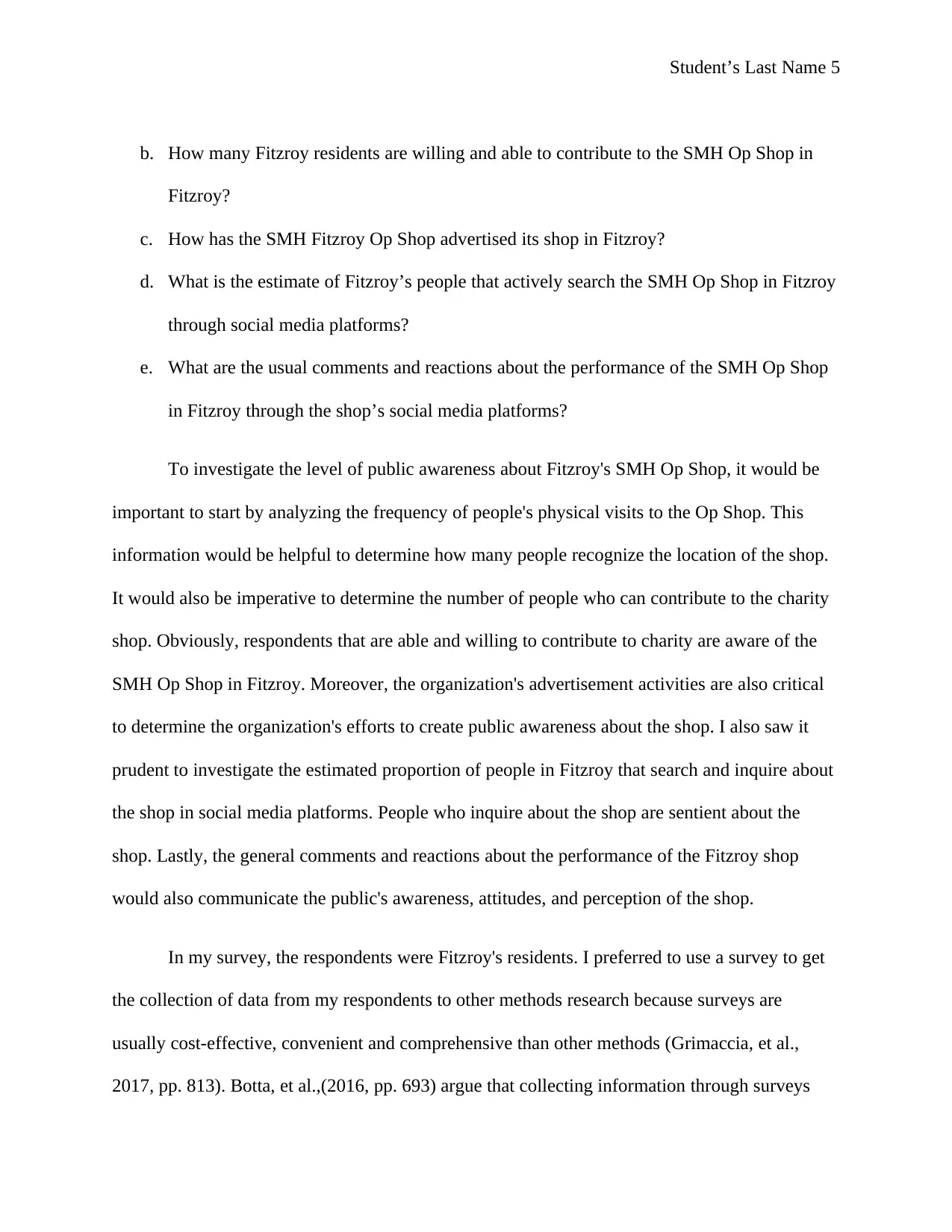
Student’s Last Name 5
b. How many Fitzroy residents are willing and able to contribute to the SMH Op Shop in
Fitzroy?
c. How has the SMH Fitzroy Op Shop advertised its shop in Fitzroy?
d. What is the estimate of Fitzroy’s people that actively search the SMH Op Shop in Fitzroy
through social media platforms?
e. What are the usual comments and reactions about the performance of the SMH Op Shop
in Fitzroy through the shop’s social media platforms?
To investigate the level of public awareness about Fitzroy's SMH Op Shop, it would be
important to start by analyzing the frequency of people's physical visits to the Op Shop. This
information would be helpful to determine how many people recognize the location of the shop.
It would also be imperative to determine the number of people who can contribute to the charity
shop. Obviously, respondents that are able and willing to contribute to charity are aware of the
SMH Op Shop in Fitzroy. Moreover, the organization's advertisement activities are also critical
to determine the organization's efforts to create public awareness about the shop. I also saw it
prudent to investigate the estimated proportion of people in Fitzroy that search and inquire about
the shop in social media platforms. People who inquire about the shop are sentient about the
shop. Lastly, the general comments and reactions about the performance of the Fitzroy shop
would also communicate the public's awareness, attitudes, and perception of the shop.
In my survey, the respondents were Fitzroy's residents. I preferred to use a survey to get
the collection of data from my respondents to other methods research because surveys are
usually cost-effective, convenient and comprehensive than other methods (Grimaccia, et al.,
2017, pp. 813). Botta, et al.,(2016, pp. 693) argue that collecting information through surveys
b. How many Fitzroy residents are willing and able to contribute to the SMH Op Shop in
Fitzroy?
c. How has the SMH Fitzroy Op Shop advertised its shop in Fitzroy?
d. What is the estimate of Fitzroy’s people that actively search the SMH Op Shop in Fitzroy
through social media platforms?
e. What are the usual comments and reactions about the performance of the SMH Op Shop
in Fitzroy through the shop’s social media platforms?
To investigate the level of public awareness about Fitzroy's SMH Op Shop, it would be
important to start by analyzing the frequency of people's physical visits to the Op Shop. This
information would be helpful to determine how many people recognize the location of the shop.
It would also be imperative to determine the number of people who can contribute to the charity
shop. Obviously, respondents that are able and willing to contribute to charity are aware of the
SMH Op Shop in Fitzroy. Moreover, the organization's advertisement activities are also critical
to determine the organization's efforts to create public awareness about the shop. I also saw it
prudent to investigate the estimated proportion of people in Fitzroy that search and inquire about
the shop in social media platforms. People who inquire about the shop are sentient about the
shop. Lastly, the general comments and reactions about the performance of the Fitzroy shop
would also communicate the public's awareness, attitudes, and perception of the shop.
In my survey, the respondents were Fitzroy's residents. I preferred to use a survey to get
the collection of data from my respondents to other methods research because surveys are
usually cost-effective, convenient and comprehensive than other methods (Grimaccia, et al.,
2017, pp. 813). Botta, et al.,(2016, pp. 693) argue that collecting information through surveys
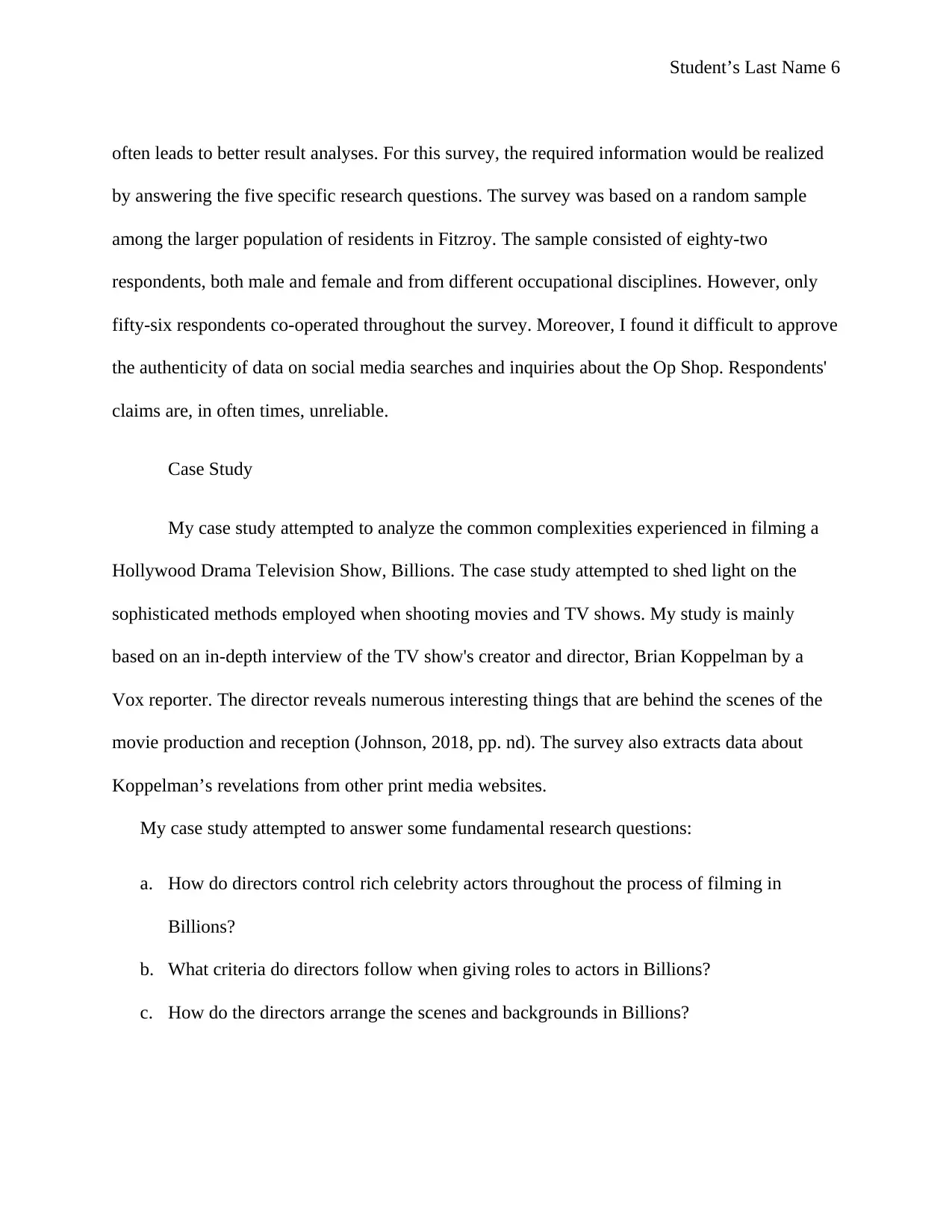
Student’s Last Name 6
often leads to better result analyses. For this survey, the required information would be realized
by answering the five specific research questions. The survey was based on a random sample
among the larger population of residents in Fitzroy. The sample consisted of eighty-two
respondents, both male and female and from different occupational disciplines. However, only
fifty-six respondents co-operated throughout the survey. Moreover, I found it difficult to approve
the authenticity of data on social media searches and inquiries about the Op Shop. Respondents'
claims are, in often times, unreliable.
Case Study
My case study attempted to analyze the common complexities experienced in filming a
Hollywood Drama Television Show, Billions. The case study attempted to shed light on the
sophisticated methods employed when shooting movies and TV shows. My study is mainly
based on an in-depth interview of the TV show's creator and director, Brian Koppelman by a
Vox reporter. The director reveals numerous interesting things that are behind the scenes of the
movie production and reception (Johnson, 2018, pp. nd). The survey also extracts data about
Koppelman’s revelations from other print media websites.
My case study attempted to answer some fundamental research questions:
a. How do directors control rich celebrity actors throughout the process of filming in
Billions?
b. What criteria do directors follow when giving roles to actors in Billions?
c. How do the directors arrange the scenes and backgrounds in Billions?
often leads to better result analyses. For this survey, the required information would be realized
by answering the five specific research questions. The survey was based on a random sample
among the larger population of residents in Fitzroy. The sample consisted of eighty-two
respondents, both male and female and from different occupational disciplines. However, only
fifty-six respondents co-operated throughout the survey. Moreover, I found it difficult to approve
the authenticity of data on social media searches and inquiries about the Op Shop. Respondents'
claims are, in often times, unreliable.
Case Study
My case study attempted to analyze the common complexities experienced in filming a
Hollywood Drama Television Show, Billions. The case study attempted to shed light on the
sophisticated methods employed when shooting movies and TV shows. My study is mainly
based on an in-depth interview of the TV show's creator and director, Brian Koppelman by a
Vox reporter. The director reveals numerous interesting things that are behind the scenes of the
movie production and reception (Johnson, 2018, pp. nd). The survey also extracts data about
Koppelman’s revelations from other print media websites.
My case study attempted to answer some fundamental research questions:
a. How do directors control rich celebrity actors throughout the process of filming in
Billions?
b. What criteria do directors follow when giving roles to actors in Billions?
c. How do the directors arrange the scenes and backgrounds in Billions?
⊘ This is a preview!⊘
Do you want full access?
Subscribe today to unlock all pages.

Trusted by 1+ million students worldwide
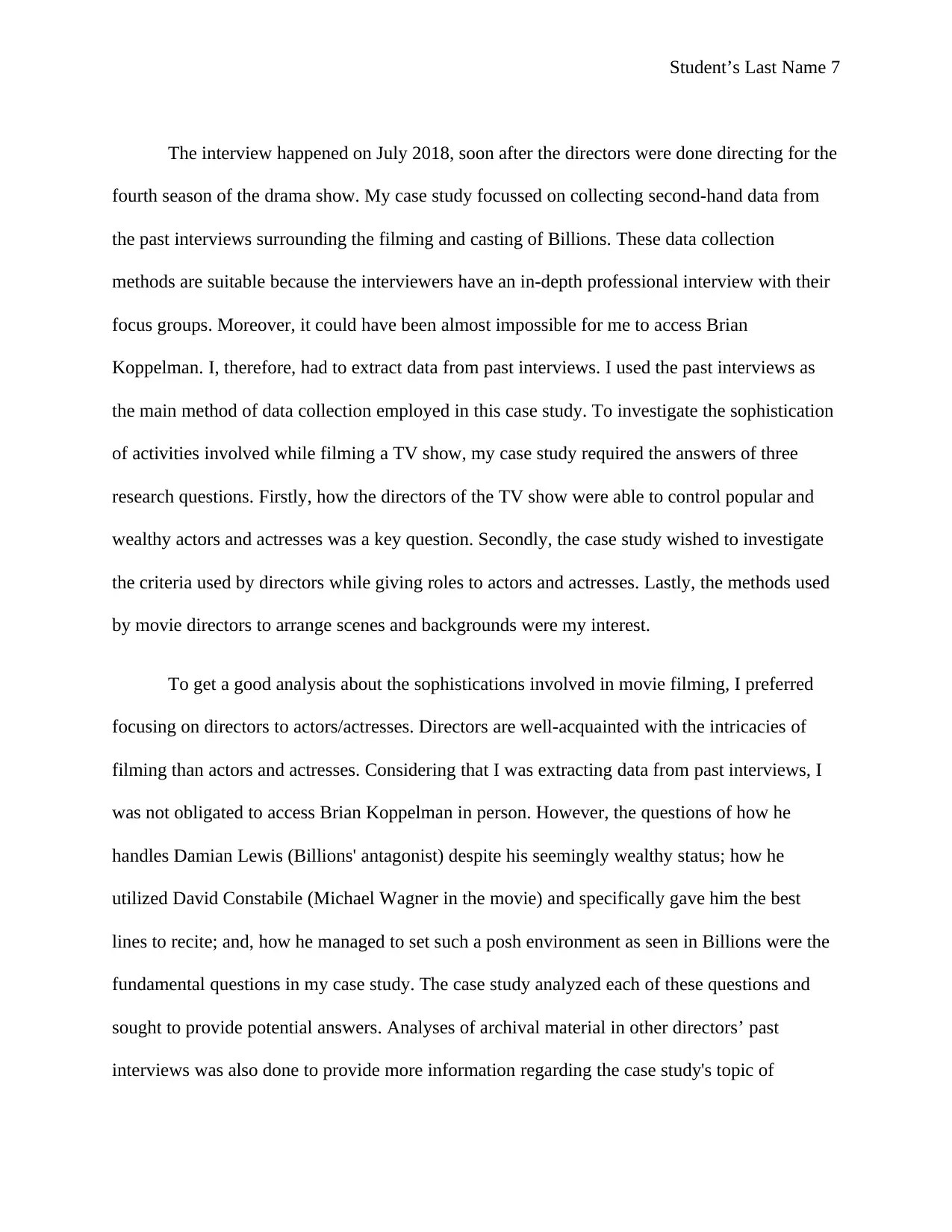
Student’s Last Name 7
The interview happened on July 2018, soon after the directors were done directing for the
fourth season of the drama show. My case study focussed on collecting second-hand data from
the past interviews surrounding the filming and casting of Billions. These data collection
methods are suitable because the interviewers have an in-depth professional interview with their
focus groups. Moreover, it could have been almost impossible for me to access Brian
Koppelman. I, therefore, had to extract data from past interviews. I used the past interviews as
the main method of data collection employed in this case study. To investigate the sophistication
of activities involved while filming a TV show, my case study required the answers of three
research questions. Firstly, how the directors of the TV show were able to control popular and
wealthy actors and actresses was a key question. Secondly, the case study wished to investigate
the criteria used by directors while giving roles to actors and actresses. Lastly, the methods used
by movie directors to arrange scenes and backgrounds were my interest.
To get a good analysis about the sophistications involved in movie filming, I preferred
focusing on directors to actors/actresses. Directors are well-acquainted with the intricacies of
filming than actors and actresses. Considering that I was extracting data from past interviews, I
was not obligated to access Brian Koppelman in person. However, the questions of how he
handles Damian Lewis (Billions' antagonist) despite his seemingly wealthy status; how he
utilized David Constabile (Michael Wagner in the movie) and specifically gave him the best
lines to recite; and, how he managed to set such a posh environment as seen in Billions were the
fundamental questions in my case study. The case study analyzed each of these questions and
sought to provide potential answers. Analyses of archival material in other directors’ past
interviews was also done to provide more information regarding the case study's topic of
The interview happened on July 2018, soon after the directors were done directing for the
fourth season of the drama show. My case study focussed on collecting second-hand data from
the past interviews surrounding the filming and casting of Billions. These data collection
methods are suitable because the interviewers have an in-depth professional interview with their
focus groups. Moreover, it could have been almost impossible for me to access Brian
Koppelman. I, therefore, had to extract data from past interviews. I used the past interviews as
the main method of data collection employed in this case study. To investigate the sophistication
of activities involved while filming a TV show, my case study required the answers of three
research questions. Firstly, how the directors of the TV show were able to control popular and
wealthy actors and actresses was a key question. Secondly, the case study wished to investigate
the criteria used by directors while giving roles to actors and actresses. Lastly, the methods used
by movie directors to arrange scenes and backgrounds were my interest.
To get a good analysis about the sophistications involved in movie filming, I preferred
focusing on directors to actors/actresses. Directors are well-acquainted with the intricacies of
filming than actors and actresses. Considering that I was extracting data from past interviews, I
was not obligated to access Brian Koppelman in person. However, the questions of how he
handles Damian Lewis (Billions' antagonist) despite his seemingly wealthy status; how he
utilized David Constabile (Michael Wagner in the movie) and specifically gave him the best
lines to recite; and, how he managed to set such a posh environment as seen in Billions were the
fundamental questions in my case study. The case study analyzed each of these questions and
sought to provide potential answers. Analyses of archival material in other directors’ past
interviews was also done to provide more information regarding the case study's topic of
Paraphrase This Document
Need a fresh take? Get an instant paraphrase of this document with our AI Paraphraser
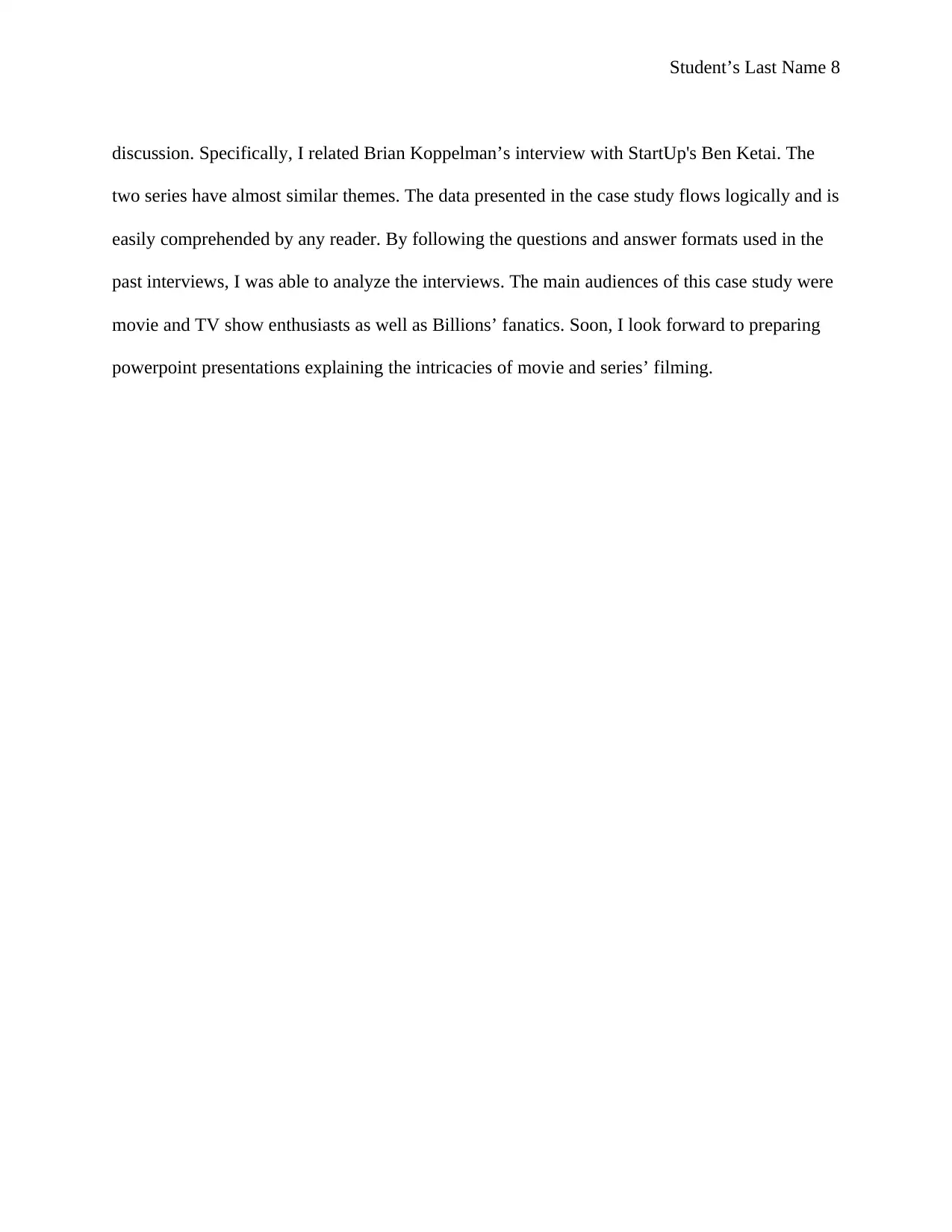
Student’s Last Name 8
discussion. Specifically, I related Brian Koppelman’s interview with StartUp's Ben Ketai. The
two series have almost similar themes. The data presented in the case study flows logically and is
easily comprehended by any reader. By following the questions and answer formats used in the
past interviews, I was able to analyze the interviews. The main audiences of this case study were
movie and TV show enthusiasts as well as Billions’ fanatics. Soon, I look forward to preparing
powerpoint presentations explaining the intricacies of movie and series’ filming.
discussion. Specifically, I related Brian Koppelman’s interview with StartUp's Ben Ketai. The
two series have almost similar themes. The data presented in the case study flows logically and is
easily comprehended by any reader. By following the questions and answer formats used in the
past interviews, I was able to analyze the interviews. The main audiences of this case study were
movie and TV show enthusiasts as well as Billions’ fanatics. Soon, I look forward to preparing
powerpoint presentations explaining the intricacies of movie and series’ filming.
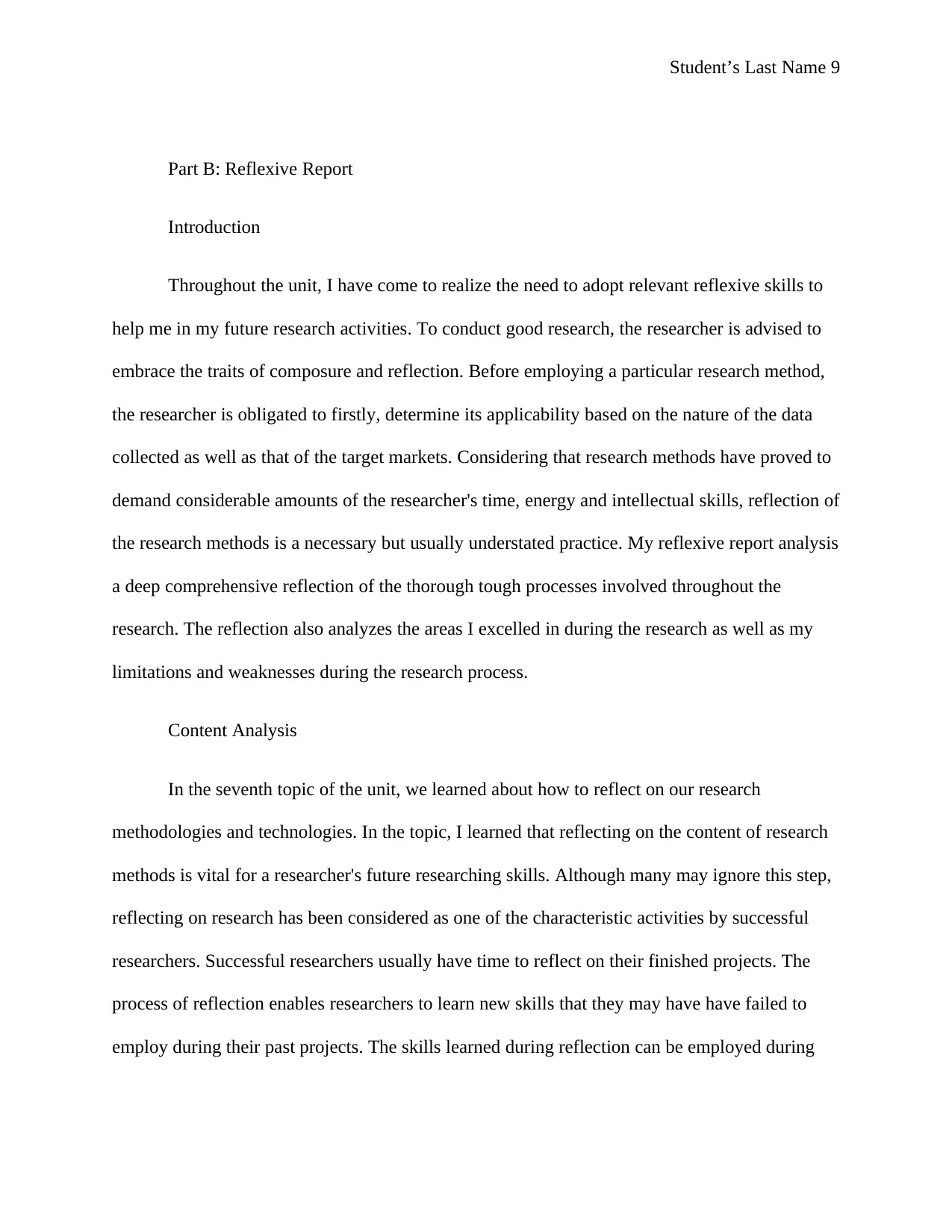
Student’s Last Name 9
Part B: Reflexive Report
Introduction
Throughout the unit, I have come to realize the need to adopt relevant reflexive skills to
help me in my future research activities. To conduct good research, the researcher is advised to
embrace the traits of composure and reflection. Before employing a particular research method,
the researcher is obligated to firstly, determine its applicability based on the nature of the data
collected as well as that of the target markets. Considering that research methods have proved to
demand considerable amounts of the researcher's time, energy and intellectual skills, reflection of
the research methods is a necessary but usually understated practice. My reflexive report analysis
a deep comprehensive reflection of the thorough tough processes involved throughout the
research. The reflection also analyzes the areas I excelled in during the research as well as my
limitations and weaknesses during the research process.
Content Analysis
In the seventh topic of the unit, we learned about how to reflect on our research
methodologies and technologies. In the topic, I learned that reflecting on the content of research
methods is vital for a researcher's future researching skills. Although many may ignore this step,
reflecting on research has been considered as one of the characteristic activities by successful
researchers. Successful researchers usually have time to reflect on their finished projects. The
process of reflection enables researchers to learn new skills that they may have have failed to
employ during their past projects. The skills learned during reflection can be employed during
Part B: Reflexive Report
Introduction
Throughout the unit, I have come to realize the need to adopt relevant reflexive skills to
help me in my future research activities. To conduct good research, the researcher is advised to
embrace the traits of composure and reflection. Before employing a particular research method,
the researcher is obligated to firstly, determine its applicability based on the nature of the data
collected as well as that of the target markets. Considering that research methods have proved to
demand considerable amounts of the researcher's time, energy and intellectual skills, reflection of
the research methods is a necessary but usually understated practice. My reflexive report analysis
a deep comprehensive reflection of the thorough tough processes involved throughout the
research. The reflection also analyzes the areas I excelled in during the research as well as my
limitations and weaknesses during the research process.
Content Analysis
In the seventh topic of the unit, we learned about how to reflect on our research
methodologies and technologies. In the topic, I learned that reflecting on the content of research
methods is vital for a researcher's future researching skills. Although many may ignore this step,
reflecting on research has been considered as one of the characteristic activities by successful
researchers. Successful researchers usually have time to reflect on their finished projects. The
process of reflection enables researchers to learn new skills that they may have have failed to
employ during their past projects. The skills learned during reflection can be employed during
⊘ This is a preview!⊘
Do you want full access?
Subscribe today to unlock all pages.

Trusted by 1+ million students worldwide
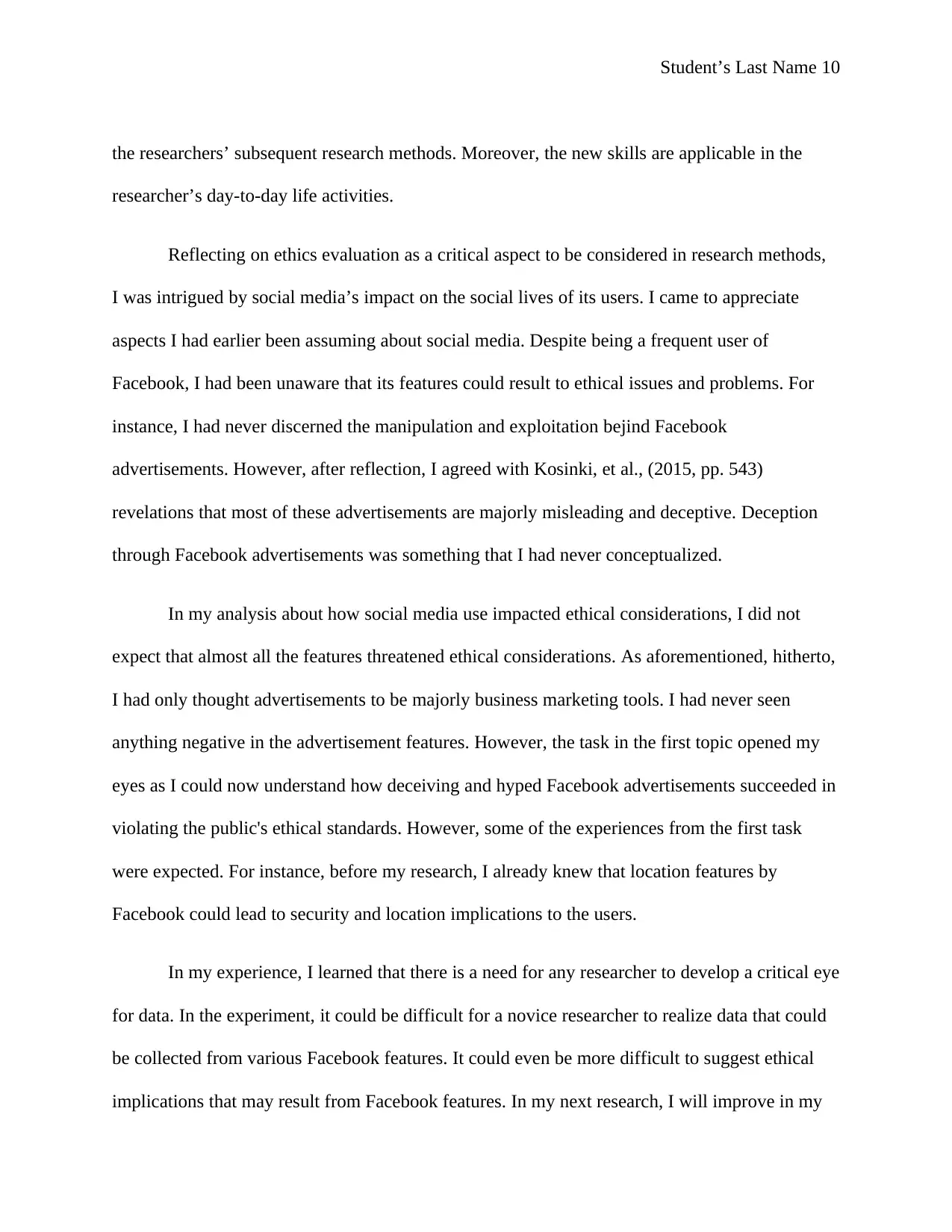
Student’s Last Name 10
the researchers’ subsequent research methods. Moreover, the new skills are applicable in the
researcher’s day-to-day life activities.
Reflecting on ethics evaluation as a critical aspect to be considered in research methods,
I was intrigued by social media’s impact on the social lives of its users. I came to appreciate
aspects I had earlier been assuming about social media. Despite being a frequent user of
Facebook, I had been unaware that its features could result to ethical issues and problems. For
instance, I had never discerned the manipulation and exploitation bejind Facebook
advertisements. However, after reflection, I agreed with Kosinki, et al., (2015, pp. 543)
revelations that most of these advertisements are majorly misleading and deceptive. Deception
through Facebook advertisements was something that I had never conceptualized.
In my analysis about how social media use impacted ethical considerations, I did not
expect that almost all the features threatened ethical considerations. As aforementioned, hitherto,
I had only thought advertisements to be majorly business marketing tools. I had never seen
anything negative in the advertisement features. However, the task in the first topic opened my
eyes as I could now understand how deceiving and hyped Facebook advertisements succeeded in
violating the public's ethical standards. However, some of the experiences from the first task
were expected. For instance, before my research, I already knew that location features by
Facebook could lead to security and location implications to the users.
In my experience, I learned that there is a need for any researcher to develop a critical eye
for data. In the experiment, it could be difficult for a novice researcher to realize data that could
be collected from various Facebook features. It could even be more difficult to suggest ethical
implications that may result from Facebook features. In my next research, I will improve in my
the researchers’ subsequent research methods. Moreover, the new skills are applicable in the
researcher’s day-to-day life activities.
Reflecting on ethics evaluation as a critical aspect to be considered in research methods,
I was intrigued by social media’s impact on the social lives of its users. I came to appreciate
aspects I had earlier been assuming about social media. Despite being a frequent user of
Facebook, I had been unaware that its features could result to ethical issues and problems. For
instance, I had never discerned the manipulation and exploitation bejind Facebook
advertisements. However, after reflection, I agreed with Kosinki, et al., (2015, pp. 543)
revelations that most of these advertisements are majorly misleading and deceptive. Deception
through Facebook advertisements was something that I had never conceptualized.
In my analysis about how social media use impacted ethical considerations, I did not
expect that almost all the features threatened ethical considerations. As aforementioned, hitherto,
I had only thought advertisements to be majorly business marketing tools. I had never seen
anything negative in the advertisement features. However, the task in the first topic opened my
eyes as I could now understand how deceiving and hyped Facebook advertisements succeeded in
violating the public's ethical standards. However, some of the experiences from the first task
were expected. For instance, before my research, I already knew that location features by
Facebook could lead to security and location implications to the users.
In my experience, I learned that there is a need for any researcher to develop a critical eye
for data. In the experiment, it could be difficult for a novice researcher to realize data that could
be collected from various Facebook features. It could even be more difficult to suggest ethical
implications that may result from Facebook features. In my next research, I will improve in my
Paraphrase This Document
Need a fresh take? Get an instant paraphrase of this document with our AI Paraphraser
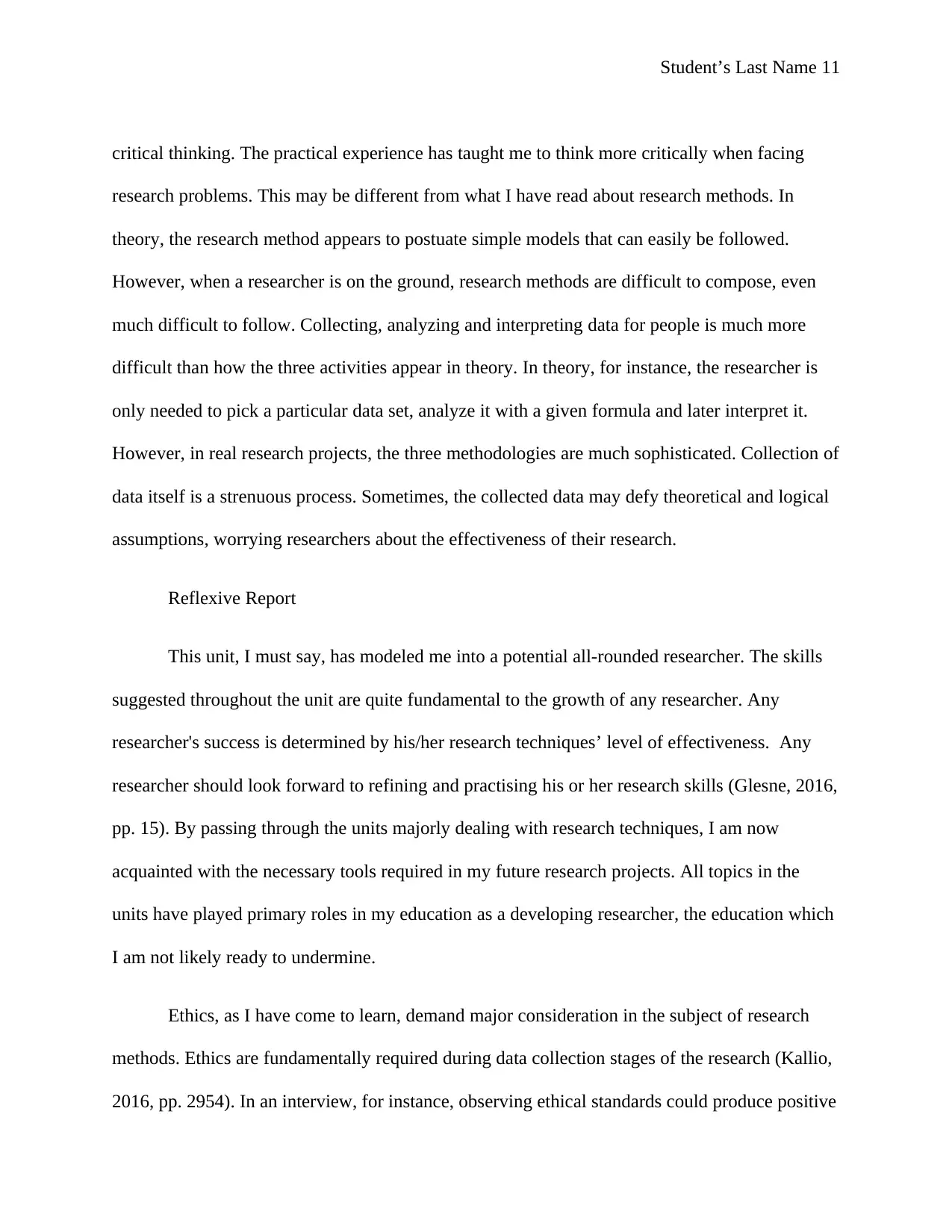
Student’s Last Name 11
critical thinking. The practical experience has taught me to think more critically when facing
research problems. This may be different from what I have read about research methods. In
theory, the research method appears to postuate simple models that can easily be followed.
However, when a researcher is on the ground, research methods are difficult to compose, even
much difficult to follow. Collecting, analyzing and interpreting data for people is much more
difficult than how the three activities appear in theory. In theory, for instance, the researcher is
only needed to pick a particular data set, analyze it with a given formula and later interpret it.
However, in real research projects, the three methodologies are much sophisticated. Collection of
data itself is a strenuous process. Sometimes, the collected data may defy theoretical and logical
assumptions, worrying researchers about the effectiveness of their research.
Reflexive Report
This unit, I must say, has modeled me into a potential all-rounded researcher. The skills
suggested throughout the unit are quite fundamental to the growth of any researcher. Any
researcher's success is determined by his/her research techniques’ level of effectiveness. Any
researcher should look forward to refining and practising his or her research skills (Glesne, 2016,
pp. 15). By passing through the units majorly dealing with research techniques, I am now
acquainted with the necessary tools required in my future research projects. All topics in the
units have played primary roles in my education as a developing researcher, the education which
I am not likely ready to undermine.
Ethics, as I have come to learn, demand major consideration in the subject of research
methods. Ethics are fundamentally required during data collection stages of the research (Kallio,
2016, pp. 2954). In an interview, for instance, observing ethical standards could produce positive
critical thinking. The practical experience has taught me to think more critically when facing
research problems. This may be different from what I have read about research methods. In
theory, the research method appears to postuate simple models that can easily be followed.
However, when a researcher is on the ground, research methods are difficult to compose, even
much difficult to follow. Collecting, analyzing and interpreting data for people is much more
difficult than how the three activities appear in theory. In theory, for instance, the researcher is
only needed to pick a particular data set, analyze it with a given formula and later interpret it.
However, in real research projects, the three methodologies are much sophisticated. Collection of
data itself is a strenuous process. Sometimes, the collected data may defy theoretical and logical
assumptions, worrying researchers about the effectiveness of their research.
Reflexive Report
This unit, I must say, has modeled me into a potential all-rounded researcher. The skills
suggested throughout the unit are quite fundamental to the growth of any researcher. Any
researcher's success is determined by his/her research techniques’ level of effectiveness. Any
researcher should look forward to refining and practising his or her research skills (Glesne, 2016,
pp. 15). By passing through the units majorly dealing with research techniques, I am now
acquainted with the necessary tools required in my future research projects. All topics in the
units have played primary roles in my education as a developing researcher, the education which
I am not likely ready to undermine.
Ethics, as I have come to learn, demand major consideration in the subject of research
methods. Ethics are fundamentally required during data collection stages of the research (Kallio,
2016, pp. 2954). In an interview, for instance, observing ethical standards could produce positive
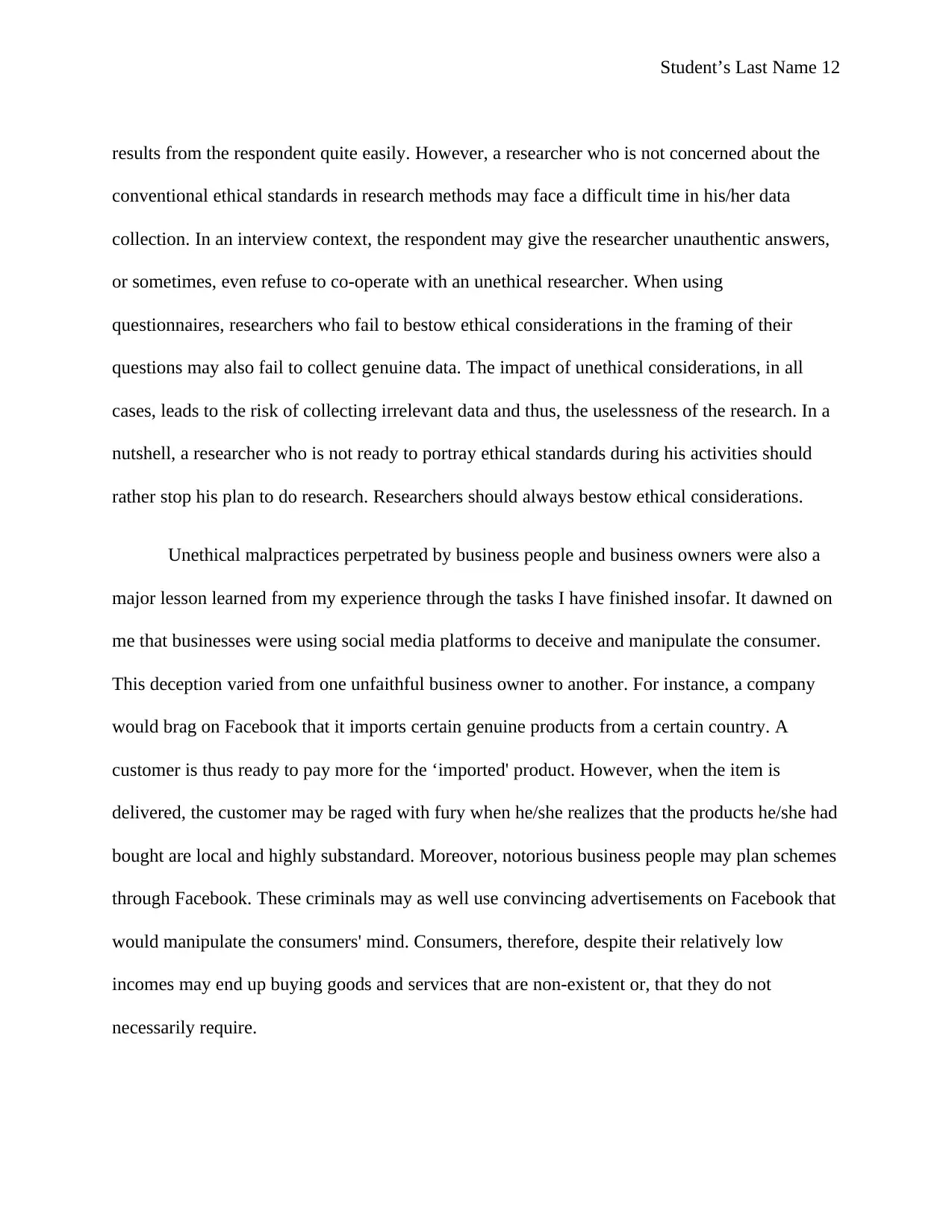
Student’s Last Name 12
results from the respondent quite easily. However, a researcher who is not concerned about the
conventional ethical standards in research methods may face a difficult time in his/her data
collection. In an interview context, the respondent may give the researcher unauthentic answers,
or sometimes, even refuse to co-operate with an unethical researcher. When using
questionnaires, researchers who fail to bestow ethical considerations in the framing of their
questions may also fail to collect genuine data. The impact of unethical considerations, in all
cases, leads to the risk of collecting irrelevant data and thus, the uselessness of the research. In a
nutshell, a researcher who is not ready to portray ethical standards during his activities should
rather stop his plan to do research. Researchers should always bestow ethical considerations.
Unethical malpractices perpetrated by business people and business owners were also a
major lesson learned from my experience through the tasks I have finished insofar. It dawned on
me that businesses were using social media platforms to deceive and manipulate the consumer.
This deception varied from one unfaithful business owner to another. For instance, a company
would brag on Facebook that it imports certain genuine products from a certain country. A
customer is thus ready to pay more for the ‘imported' product. However, when the item is
delivered, the customer may be raged with fury when he/she realizes that the products he/she had
bought are local and highly substandard. Moreover, notorious business people may plan schemes
through Facebook. These criminals may as well use convincing advertisements on Facebook that
would manipulate the consumers' mind. Consumers, therefore, despite their relatively low
incomes may end up buying goods and services that are non-existent or, that they do not
necessarily require.
results from the respondent quite easily. However, a researcher who is not concerned about the
conventional ethical standards in research methods may face a difficult time in his/her data
collection. In an interview context, the respondent may give the researcher unauthentic answers,
or sometimes, even refuse to co-operate with an unethical researcher. When using
questionnaires, researchers who fail to bestow ethical considerations in the framing of their
questions may also fail to collect genuine data. The impact of unethical considerations, in all
cases, leads to the risk of collecting irrelevant data and thus, the uselessness of the research. In a
nutshell, a researcher who is not ready to portray ethical standards during his activities should
rather stop his plan to do research. Researchers should always bestow ethical considerations.
Unethical malpractices perpetrated by business people and business owners were also a
major lesson learned from my experience through the tasks I have finished insofar. It dawned on
me that businesses were using social media platforms to deceive and manipulate the consumer.
This deception varied from one unfaithful business owner to another. For instance, a company
would brag on Facebook that it imports certain genuine products from a certain country. A
customer is thus ready to pay more for the ‘imported' product. However, when the item is
delivered, the customer may be raged with fury when he/she realizes that the products he/she had
bought are local and highly substandard. Moreover, notorious business people may plan schemes
through Facebook. These criminals may as well use convincing advertisements on Facebook that
would manipulate the consumers' mind. Consumers, therefore, despite their relatively low
incomes may end up buying goods and services that are non-existent or, that they do not
necessarily require.
⊘ This is a preview!⊘
Do you want full access?
Subscribe today to unlock all pages.

Trusted by 1+ million students worldwide
1 out of 22
Related Documents
Your All-in-One AI-Powered Toolkit for Academic Success.
+13062052269
info@desklib.com
Available 24*7 on WhatsApp / Email
![[object Object]](/_next/static/media/star-bottom.7253800d.svg)
Unlock your academic potential
Copyright © 2020–2026 A2Z Services. All Rights Reserved. Developed and managed by ZUCOL.





